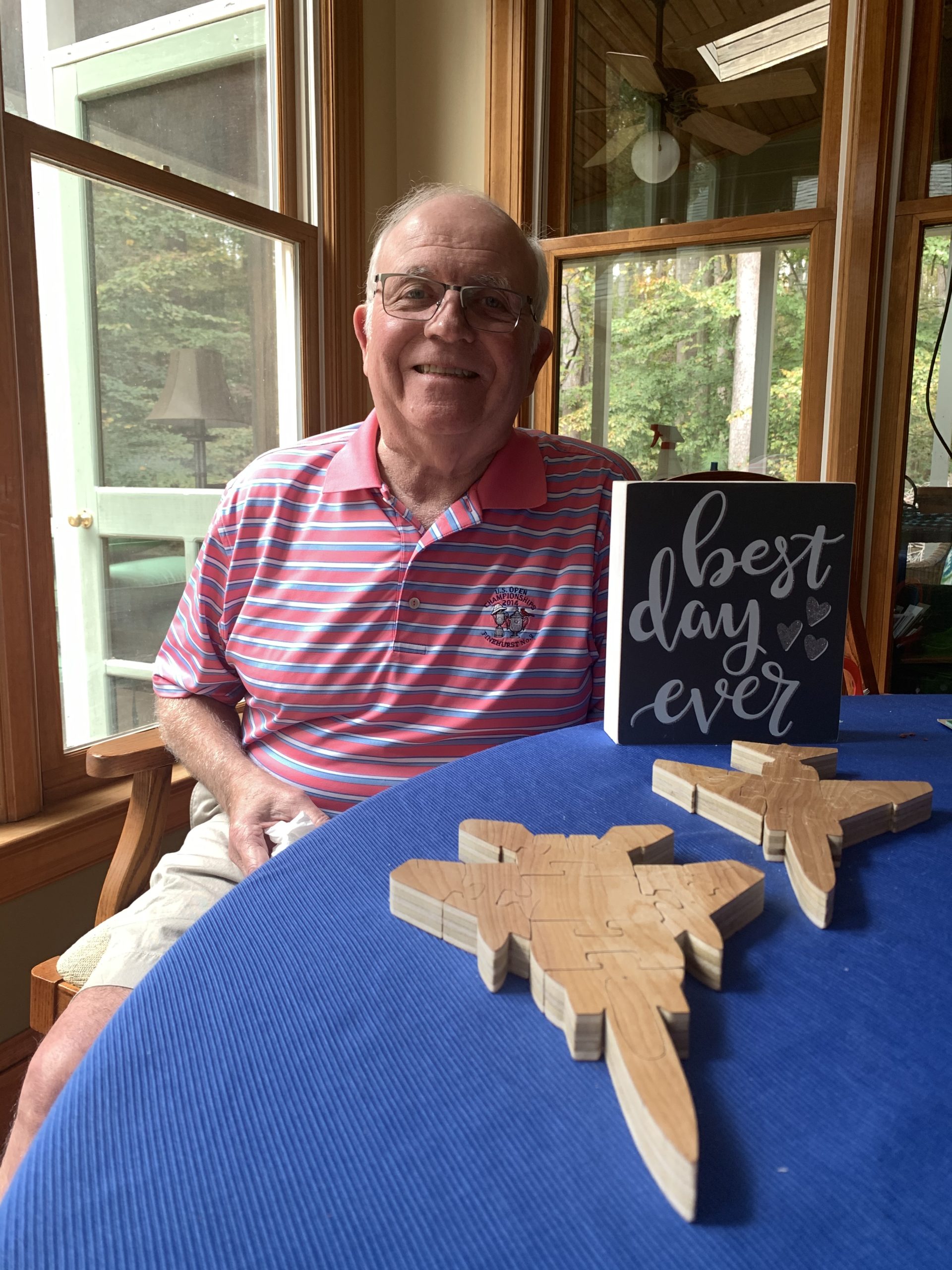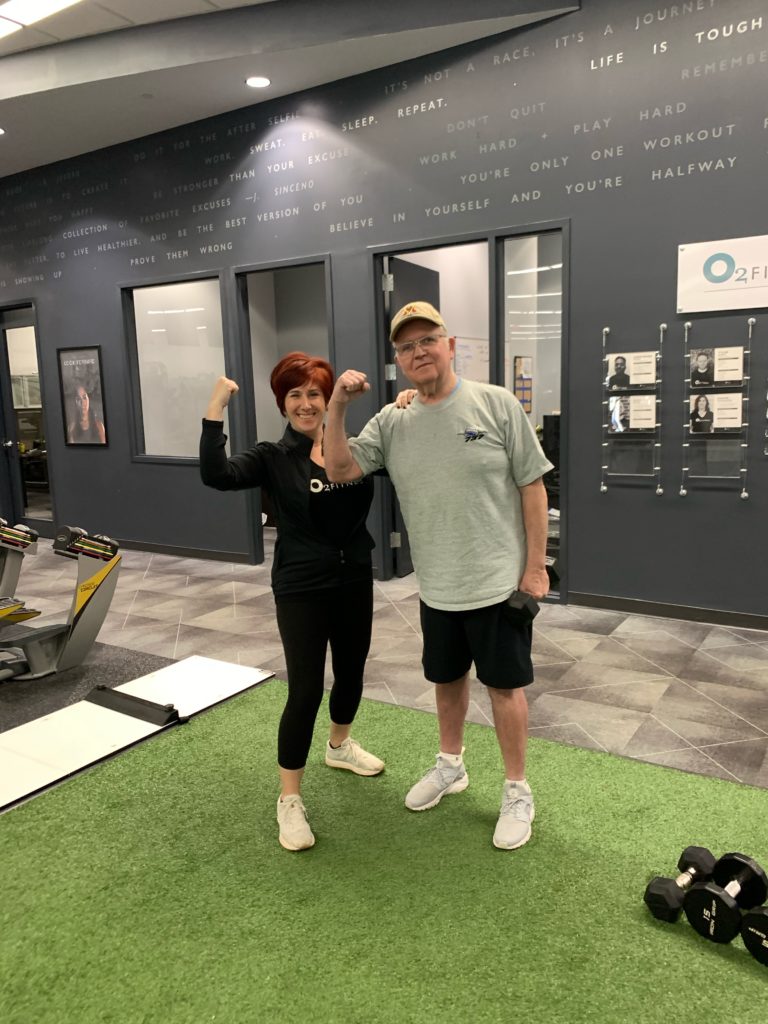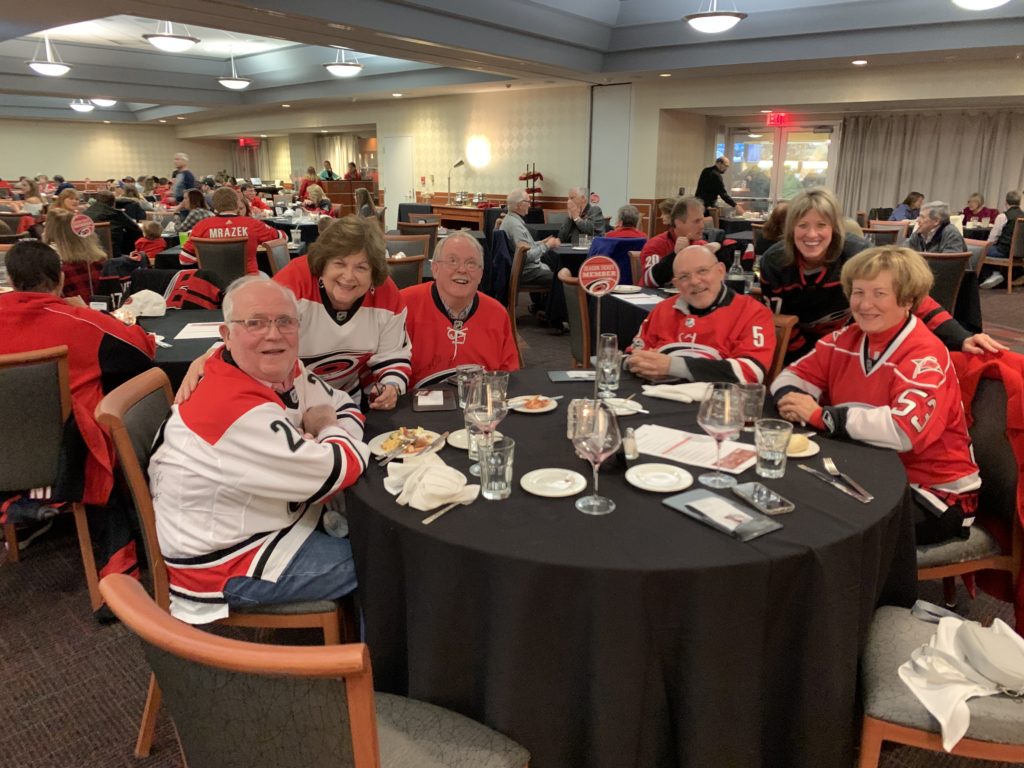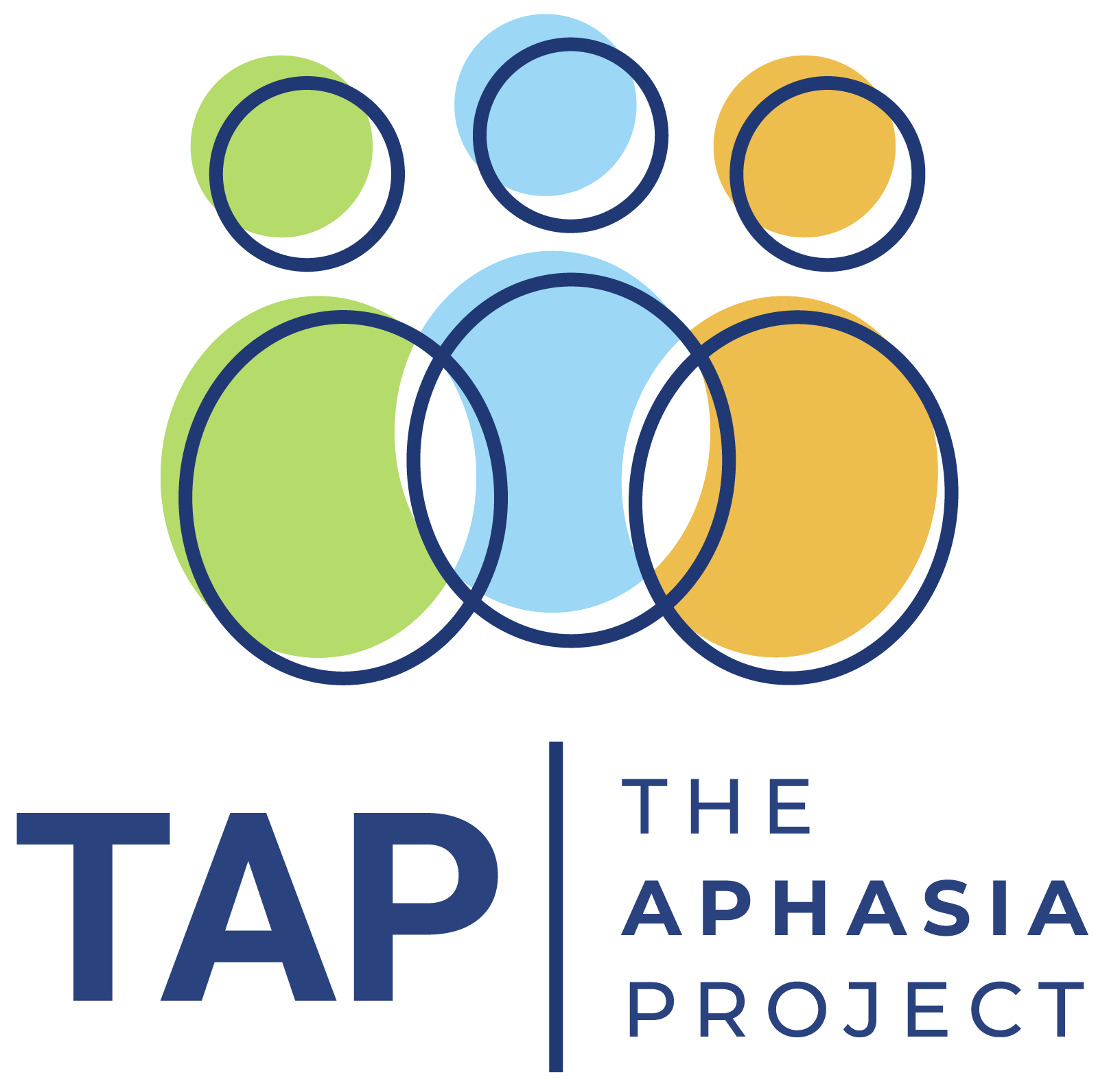Navigating a New Normal while Never Giving Up
– Dick Walker –
Maura’s Intro:
Many of our clients/families, even those with medical or healthcare experience, are thrown into a world of new vocabulary when dealing with the diagnosis of stroke and aphasia. First you are told that your loved one may not survive, and then often told that if they do live, they will have devastating and lasting disability. There may be those that attempt to communicate hope, but the sheer intensity of information can be overwhelming.
When I met Dick and Jane, and their amazing family, I was so moved by their expressions of dignity for this survivor and receptiveness to all tools and strategies to improve language access. They attended Learning to Speak Aphasia training, they requested additional information, asked questions and provided support for Dick to fully participate in rehabilitation. It was heartwarming to hear of stories of Dick’s pilot adventures and watch the family truly listen. In a world where communicative access and expression is such a challenge, listening, encouraging, and restating is a valuable skill set.
Dick continues to make progress, not just because he participates in virtual programs with TAP, but because he is encouraged to do what he loves… golfing with friends and enjoying his family time. Check out the story of a bucket list vacation ending in a supreme challenge, and yet, dealt with with grace and grit. Enjoy!
Dick (and Jane) Walker – Written by Jane
On August 1, 2019, Dick and I left RDU for the trip of a lifetime, an Alaskan cruise on Holland America. Dick had booked our “bucket list trip” in 2018 and meticulously planned it. We had a wonderful time with our close friends and my brother & sister-in-law. Our travel companions all said that Dick was in good spirits and in good health throughout the week-long trip. We enjoyed the ship’s meals, activities, and shore excursions; the trip met our high expectations. Since one of our retirement goals was traveling, we were pleased enough to buy a voucher for a future cruise before we left the ship.
We disembarked & traveled by bus to SeaTac Airport and after saying goodbye to my brother and his wife at the gate, things rapidly changed. I knew something was wrong when Dick got confused in an airport he had traversed hundreds of times in the years he worked for American Airlines & Boeing. When I asked him for his boarding pass so that we could go to our gate, his speech became incomprehensible. I asked the gate agent to call for medical help. Dick was transported to Valley ER and after assessments and imaging, it was clear that he had had a massive stroke. Later, I would learn that the main stroke was in his left frontal lobe, affecting speech and language. He was then transferred to Harborview Medical Center, a Trauma 1 level hospital staffed by neurosurgeons. Thankfully, he did not need surgery. Two of the couples who traveled on the cruise with us were still in Seattle. Along with them, a close friend who had moved to Seattle, and my family & other caring friends, I was taken care of during those first shocking hours and the following weeks. My daughter set up Dick’s site on Caring Bridge. Comments, phone calls & texts from our cheerleaders assured me that we were in their prayers; that was comforting!

My son Jeff and my daughter Jenny arrived that first night, even though I told them “I can handle this.” (I couldn’t, not even a possibility.) Somehow, we all made it through the next two weeks. Dick could not speak, swallow, or move, particularly on his right side. He was moved to the acute care floor after two days in ICU. Daily therapies (OT, PT, & Speech) were designed to help him regain enough strength to endure a trip home to Raleigh as well as participate in three hours of intense daily therapy when we arrived home. Thankfully, we had purchased trip insurance, so when the time came, Kathy, our experienced flight nurse, coordinated all the many aspects of transport by ambulance to SeaTac, a very long flight home due to weather, and an ambulance transfer to Wake Med Rehab Hospital. At Wake Med, Dick regained his strength and participated in 3 or more hours of therapy per day with dedicated, hard-working therapists (Jonathan, Darlene, Haley, Megan, & Karen). Haley, his primary Speech Language Therapist, was very familiar with TAP Unlimited, and she used many TAP strategies.
At the time of Dick’s stroke, I was working part-time as a Speech/Language Pathologist for Wake County Schools. While we were in Seattle, two of my SLP friends took the time to call or text me. They both told me about an amazing organization, Triangle Aphasia Project, and suggested that I call Maura when we arrived home. Since I had only worked with children during my long career, there were many aspects of Dick’s stroke that were very confusing. Stroke survivors fight an uphill battle, and are vulnerable to myriad complications. It can be overwhelming for both the stroke patient and family members. Maura came to Wake Med and met with our whole family. She assured us that Dick’s intelligence was there; we just needed to find new ways for him to communicate with us, his doctors, and his therapists. She gave us some strategies that were easy to implement. Dick was diagnosed with aphasia and short term memory deficits among a few other conditions. Thankfully, his long term memory and reading skills were intact, although he had to relearn his name, birthdate, & other information. He never seemed to waiver during long therapy sessions. He didn’t seem to lack confidence that pain was temporary and all would be well in the end. He proved to his therapists that he could overcome obstacles as he learned to walk again, regained movement & fine motor skills in his right hand, and learned to talk to us and answer questions again.
During the last week of September, I, along with as many of our family members who were available, attended a “Learning How To Speak Aphasia” class at TAP’s Cary location. The information that Maura presented was invaluable. I learned that due to neuroplasticity of the brain, Dick will continue making progress for years; one doctor had told me that he would only make improvement in the first 6-12 months. Maura explained in detail what aphasia, anomia, apraxia, and other speech deficits are. She encouraged us to remain connected to family, friends & our community, stay motivated & determined, and work towards “doing what you love”.
Also during his last week at Wake Med Rehab, my daughter and I toured most of the skilled nursing facilities in the Raleigh Durham area. At some, we were told that I would not be allowed to watch or participate in his therapy sessions. I knew that wasn’t going to work for us; I wanted to know what he was doing during therapy so that I could build on those skills, particularly in language and conversation. I also wanted Dick to enjoy his meals in a dining room, not eat alone in his room. We found two facilities that served meals in a dining room for their rehab patients. Choosing the appropriate SNF reminded me of the college application process; there are so many considerations. In the end, the facility can invite you to move there or tell you that they do not have a bed for your loved one.

Dick moved from Wake Med Rehab to Bella Rose, an upscale SNF in Garner, NC, on September 25. During that time, my sister Ginga and her husband Owen, who own a renovation business, went to our Raleigh home and make changes so that our home would be safe & accessible for Dick. During the three weeks he was at Bella Rose, he participated in OT (Kaitlyn), PT (Savannah), and Speech Therapy (Kathy). He came home from Bella Rose on October 18, 2019. In late October, Dick continued to receive out-patient OT (Alli), PT (Sam), and Speech/Language Therapy (Lorraine) at Steps for Recovery. Today, he has progressed from knowing, but not being able to state his own name, to conversation, from not swallowing to a regular diet, and from not moving to walking and playing golf once a week! He has “graduated” from both OT and PT.
In March, 2020, we started accessing TAP classes at the Cary location. Then, Covid-19 started spreading throughout the United States, and everything shut down. For two weeks in March, we had no resources; it was a difficult time! I tried to provide speech/language therapy for Dick. I think that’s when I realized how valuable TAP Unlimited is. Maura, her staff, SLP’s, and volunteers went to work and started providing on-line zoom classes; they made it possible to participate in valuable language therapy from our home.

I know that Dick would not have made the progress he has made without TAP. As his primary caregiver, TAP has been a resource for me, also. Maura has the vision, dedication, and persistence to keep TAP Unlimited working smoothly. Her team of dedicated, licensed SLP’s spend hours planning classes that focus on subjects such as conversation, music, reading, virtual traveling, & movies. More recently, many additional classes in cooking, current events, hobbies, and others have been added. There is no limit to the number of classes a person can sign in for. Dick participated in 28 – 30 hours of classes in both September and October. Since the classes are zoom classes, they are not limited to clients in NC. We have gotten to know other class members, and we have become part of the awesome TAP family. Dick tells his life-long friends that he has a job (surprising, because they all know he is retired!), which is attending classes and improving his communication skills. Our journey has only just begun; we have many challenges to overcome. We are very, very fortunate to have the support of others at TAP who understand what our day-to-day challenges are on this long road to recovery.
TAP Unlimited’s Mission is “to serve individuals with aphasia, their families, and the community through innovative life participation approaches that maximize communicative potential and reduce barriers to social reengagement”. Maura and her team value each very unique stroke and TBI client, helping them and their families make the most of their lives. Dick and I are so very grateful for them & their expertise!
From the TAP Home Office:
TAP Unlimited’s End of Year Campaign provides TAP Stakeholders an opportunity to embrace the reason for our efforts and hear from those who have been impacted by aphasia. Aphasia, as you know, can be a devastating impairment resulting in social isolation, depression and disengagement from the passions and purpose of an individual’s life. It can interrupt a career, destroy plans for retirement and threaten relationships. TAP Unlimited is embarking on its 18th year of service to those effected by aphasia across the Triangle and beyond.
Our ability to pivot and create a virtual world of connection possibilities, to stay afloat and to even thrive, has been, in no small way, a result of the generosity of our donor base. Today, we ask that you continue to support TAP by doing the following:
- Share this story. Share it on your social media, in emails to your family/friends and to those you work with…it will increase awareness of Aphasia and provide hope to those who feel alone in this journey.
- Consider an end-of-year gift to TAP. You can donate online and make it a gift by honoring someone on the aphasia journey.
- Donations can also be mailed in the form of a check or a donation of stock. Email us for more information.
Thank you for your faith in our organization and for supporting the 12 Days of TAP!
